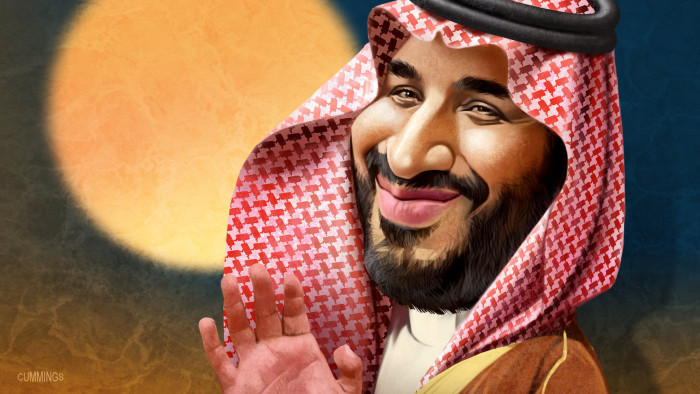Mohammed bin Salman: a combustible royal blazes a trail

Roula Khalaf, Editor of the FT, selects her favourite stories in this weekly newsletter.
On the eve of King Salman’s ascent to the throne in 2015, an executive who has since been brought into the heart of Saudi government aired his concerns about the king’s favoured son, Mohammed bin Salman.
The executive feared that the inexperienced, combustible son of an infirm father would shake the kingdom’s foundations — for the worse. “He is scary,” the executive said of Prince Mohammed, then an obscure minor royal.
For all his foreboding, he could not have predicted the extent to which Prince Mohammed, who is also known as “MbS”, would tear up the rule book. As deputy prime minister, the 34-year-old crown prince has overturned tradition, ending bans on women driving and, just this week, part-privatising Saudi Aramco, the foundation of the kingdom’s power and prosperity.
The four-year saga of the oil company’s $25bn initial public offering reached a conclusion on Wednesday with its record-breaking listing on Riyadh’s Tadawul exchange.
“The size of the deal is an in-your-face to the boss’s critics, including many family members who said he couldn’t do it,” said one banker who worked on the IPO.
Prince Mohammed’s inexorable rise has come as more senior royals were cleared to secure his path to the throne. He projected Saudi power on the regional stage. Orchestrating the kingdom’s bloody 2015 intervention in Yemen, he also led an embargo against neighbouring Qatar. But Riyadh is now scrambling to disentangle itself from these counterproductive campaigns.
Arguing that Saudi Arabia needed to take the fight to its rival, Iran, he backed his friends in the Trump administration when they bound the Islamic republic with tighter sanctions. Blowback came in the form of September’s drone attacks that temporarily knocked out half of the kingdom’s oil output. Riyadh and Washington blamed Iran.
In 2017, Prince Mohammed ordered the incarceration of hundreds of his relatives and businessmen in an anti-corruption crackdown at Riyadh’s Ritz-Carlton hotel, extracting $100bn in settlements during an unprecedented purge of the kingdom’s established elite.
This clampdown extended a zero-tolerance approach to dissent, including the arrest and alleged torture of women activists, Islamists and critics of the IPO plans. But it was last year’s killing of critical journalist Jamal Khashoggi by Saudi agents that definitively cast a pall over the prince’s reformist image.
He used to be nicknamed Abu Rasasa, “father of the bullet”, after an anecdote relating that, as a young man, he sent an envelope containing a bullet to a judge who ruled against him in a dispute.
Many refer to him today as Abu Munshar, or “father of the saw”, in a reference to the tools used in Khashoggi’s gruesome murder. The crown prince denies personal involvement, but has accepted responsibility for what many Saudis publicly refer to as “the mistake”.
Yet international censure contrasts with acclaim in Saudi Arabia, where the crown prince’s headstrong approach has dragged an ossified society into the 20th century, if not the 21st. Abandoning decades of co-operation with the clerical establishment, he has loosened social strictures. Now young people can enjoy pop concerts and sporting events.
“The system had been frozen into ‘wisdom’ and timidity when you needed a tiger to break through all these taboos,” says Ali al-Shihabi, a Saudi commentator.
Picked by his father for his attention to detail and work ethic, the locally educated prince was busily preparing for power in the years before Salman was named king, hiring consultants to produce blueprints for revitalising the economy. Advisers have since grown accustomed to late-night meetings with a man on top of his brief, deploying copious statistics and historical references.
In the early days of his tenure, he talked excitedly about breaking up monopolies in a new era of free enterprise. Listing up to 5 per cent of Saudi Aramco soon became the centrepiece of his economic vision.
Fixated on his $2tn valuation, the delayed IPO process — rebooted this summer after a bumper bond issuance — became an exercise in massaging the deal to meet prerequisites.
“You would usually use the process to discover value,” said another banker who worked on the deal. “This was all the wrong way around.”
When energy minister Khalid al-Falih was deemed an impediment, he was sacked. Saudi Aramco executives claim they have subsequently been shut out of the decision-making process. Nonetheless, Prince Mohammed’s advisers are jubilant — even if the deal was scaled back after tepid international demand. They kept to their pledge to list the shares and the company achieved the coveted $2tn valuation on the second day of trading.
But the deal has been a regional affair. Instead of binding global capital into the state’s crown jewel, it was propped up by as much as $5bn from Abu Dhabi, money from those caught in the corruption crackdown and generous lending to retail investors from Saudi banks.
“The IPO has exposed the contradictions within MbS’s plan — he promises to shrink the state to drive liberalisation away, but in fact all he has done is increase his own control,” said Madawi al-Rasheed, visiting professor at the London School of Economics. “For all the rhetoric of privatisation, he is at the centre of everything, amplifying his cult of personality.”
The writer is the FT’s Gulf correspondent
Comments